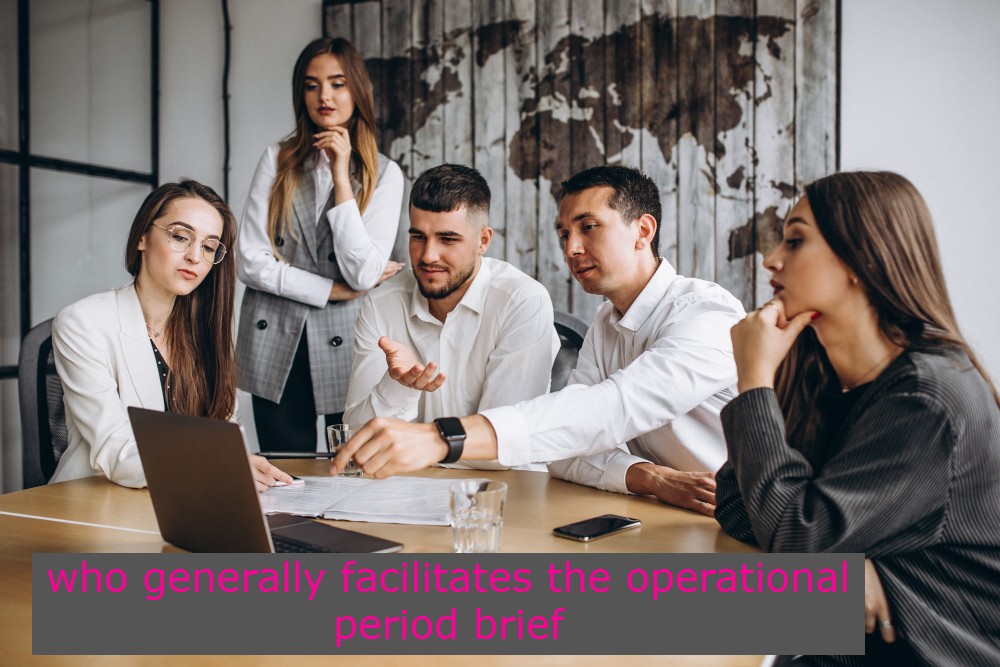
Who Generally Facilitates The Operational Period Brief?
Just like other people even you may have the curiosity to know who generally facilitates the operational period brief. Most people do not know what an operational period briefing is, who is responsible for conducting it, or the purpose of such meetings. So today we are going to discuss ‘who facilitates this briefing’.
For the improvement of the work environment, many firms use the operational period brief as a tool. These meetings are there for the betterment of the workers and mainly the company. It helps in navigating and assigning work to the employees. The meeting’s participants receive tasks to complete in order to achieve the company’s goal, which is set during the meeting.
Introduction on the operational period brief
A meeting called the operational period brief (OPB) takes place at the start of an operation. It combines regular updates, a discussion, and a report. This meeting helps in bringing everybody on one page, pertaining to what should you do and how you should do it. These conferences help you save time, which is a highly valuable resource. When everyone is aware of their precise tasks, it saves time for everyone. Everybody can also share and put up their opinion in front of everyone.
Who must appear in these meetings?
Before you start reading about who generally facilitates the operational period brief, you should have the knowledge about who must attend the briefing. Attending these meetings is open to all workers who have operational responsibilities of any kind. The following are the people who must participate in these briefings:
- Team leaders
- Planning Committee
- Management Department
- The Operations Sector Chief
- The Finance Department
- Planning Section Chief
- CEO- Chief Executive Officer
- A Liaison Officer
How long do these briefings last?
We understand the significance of these briefings, thus the meeting participants must take their time while making decisions. The subject is mostly responsible for how long the meeting lasts. These meetings typically last for an hour or two, but if the subject is extensive, they will undoubtedly go beyond their allotted time. In such a briefing, it’s critical to give each division the focus they deserve.
There shouldn’t be a time limit on using it to the utmost degree. As interaction is very crucial for the higher officials and the employees, this meeting is a place where they can interact with each other. It is also a good place to clear queries, and you do not need to run up to the management.
Who Generally Facilitates the Operational Period Brief?
The designated person as Chief of the Planning Section or the committee generally facilitates the operational period briefly. He is also responsible for many important decisions in a firm aside from leading the planning division. The chief must make sure that everyone understands their roles in an operation and that there is no deviation. He also needs to make sure that enough manpower is available for a task so that no operation lags behind. The PSC also has to create backups so that when a team is falling behind, others can help them complete the operation.
In a way, you can say he plays the role of an intermediary between the operations and the employees. He will also create a schedule so that every operation is timely completed. With all these, you can understand who leads these meetings and how important the role of the Planning Section chief is in a firm.
Why are these meetings needed?
There are many reasons for these briefings, as different companies have different reasons for keeping meetings. Below are some of the reasons:
- Its major objective is to assist with analyzing the parameters that will take place in the long run
- Everybody’s obligation and dedication are evident from the beginning.
- Everything will go as planned when you assign the tasks in order by the employees
- More personnel can start working on crucial tasks.
- There will be proper use of the resources without any wastage.
- He will create timelines and make sure everyone follows them.
What should you discuss in these briefings?
Here are some points that you should discuss in these briefings:
- Many businesses put a lot of effort into utilizing their resources to meet a variety of short- and long-term objectives. So, pay good attention to this.
- It is very important to know who will be doing which work so that there is no confusion.
- The manager explains how will it affect if there are any changes, and what precautions are necessary for them.
- When there is any growth in the enterprise who will perform the new operations?
- If the company is coming up with a new product or service it should be part of the briefings
- These meetings are essential for keeping everybody updated on the recent subjects the business is going through.
Conclusion
Now that you understand what an operational period meeting is, who attends them and why are they needed? You can confidently answer the question of who generally facilitates the operational period brief. We explained in detail why it is the Planning Section Chief who facilitates such briefings so that you understand the logic behind it.
Frequently Asked Questions(FAQs)
Who may skip these briefings?
Those who are not part of any operations may skip these meetings like the receptionist, people working in the warehouse, security, etc.
What is the ideal length of such briefings?
The length of the briefings is mostly one to two hours and in some cases, it takes a little bit more.
What are the two main advantages of such briefings?
The two main advantages of such briefings are everyone knows their role and it saves a lot of time in the future.
Who facilitates such meetings?
The committee or the designated person as Chief of the Planning Section facilitates such meetings
What must you discuss in such briefings?
The subject that should be in meetings is who will perform the operations




